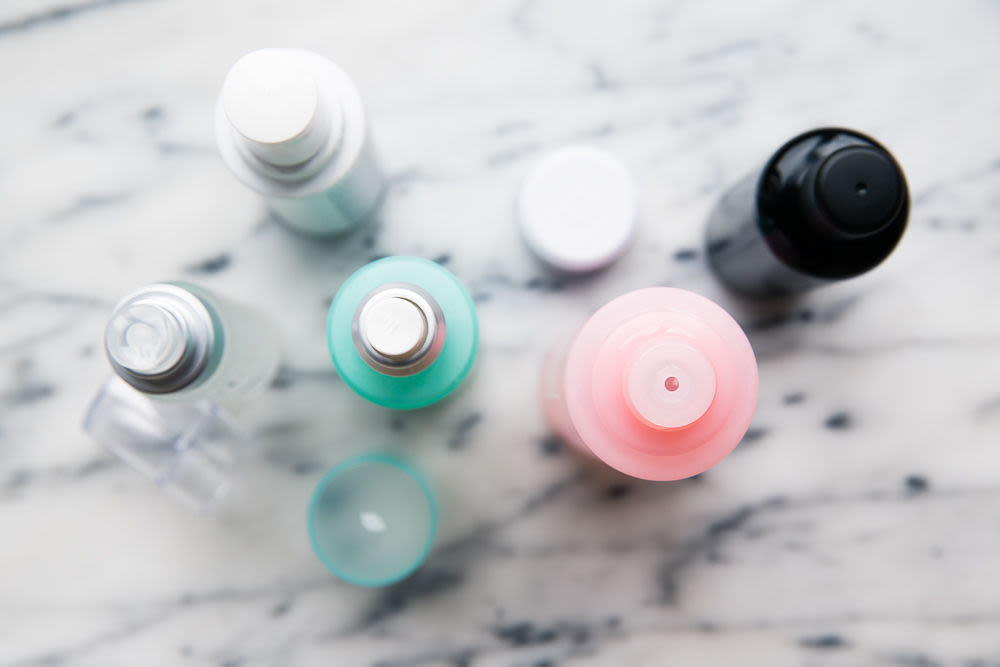Ladies and gentlemen, we have arrived... at peak summer. We’re no longer excited to wear our bathing suits and sundresses—we’ve worn them. We don’t dream about lazy afternoons sprawled out in the grass—we’ve had them. Warmer weather can go away—it's hot enough already. And because it's so hot, there's a good chance you're pit-deep in the many varieties of deodorant. Maybe you've tried a few roll-ons, or a cream, or a spray or two. Same. But a tip from Racked presented a kind of deodorant I had never considered before: toners! Or more specifically, acids. I was...intrigued? Dubious, even. I had to know more. Let’s investigate.
Why do my armpits stink in the first place?
Have you ever noticed that your sweat smells differently depending on the circumstance? For example, even though your body is slick with sweat after your summer commute, you don’t smell nearly as bad as when you’re stress sweating your way through an uncomfortable situation. That’s because the body has two different types of sweat glands: apocrine and eccrine. Eccrine glands are found all over your body, and their main purpose is temperature regulation. This is the kind of sweat you’ll be covered in after a relaxing sauna session—it’s mostly water, and as it evaporates it makes your body cooler. On the other hand, apocrine glands are only found in certain places on the body—namely, the genital region and armpits. While they also play a role in temperature regulation, the apocrine glands are mainly stimulated by hormonal or emotional changes.
B.O. happens when bacteria starts breaking down the substances in sweat. It doesn’t happen with eccrine sweat, because again, it’s mostly water. But, as this study notes, apocrine sweat “contains organic compounds that are quickly populated by bacteria on the surface of the skin.” In other words, apocrine sweat is a veritable bacteria buffet. When they start to go to town, the bacteria releases molecules called thioalcohols. This byproduct is at least one culprit of the distinct sour cream and onion-y fragrance of B.O.
OK, so how do deodorants work?
To be clear: deodorant just masks funky odors—it doesn’t stop you from sweating like an antiperspirant. But to get to how deodorants work, we’ll need to talk pH, first. The pH scale ranges from 0 (most acidic) to 14 (most alkaline). Neutral is 7—the skin tends to be slightly acidic, usually clocking in at around 5. You can read more about the skin’s acid mantle here. On the other hand, sweat from apocrine glands is “distinctly alkaline”, which brings the overall pH of your pits closer to neutral. Great news for bacteria! A neutral pH for them is like a late spring day—perfect. At a neutral pH, most bacteria can thrive and reproduce.
To stop this bacteria orgy of sorts, you have to make the pH of your skin inhospitable. As this study found, “by changing the pH of the [underarm], the bacteria are unable to act.” You can either go low on the pH scale and use something that makes your skin more acidic, or go high and pick something that makes your skin more alkaline.
Traditional deodorants are slightly acidic, so they lower your skin’s pH level, as this study notes. Some people have taken this concept and applied it to skincare acids—namely salicylic and glycolic. Like the acidic deodorants, a swipe of acid toner makes the skin too acidic for bacteria to thrive. The logic that something gentle enough to use every day on your face is also gentle enough for your pits seems sound.
But do acid toners actually stop B.O.?
There haven’t been any studies specifically on whether skincare acids do anything to stop B.O., but Taylor Staugas, Glossier’s UX Researcher Coordinator, has been doing it for a while, to medium affect. “I think I feel a difference, but it’s more that my pits feel super clean,” said Taylor. “The acid feels a little tingly on my skin.” But for the sweatiest, smelliest summer days? “I’m not convinced,” she said. In those cases, she uses it as a base for regular deodorant.
Tell me one good reason why toner might be better than traditional deodorant
Easy. Regular exfoliation helps prevent ingrown hairs, and also works to lighten any hyperpigmentation or “armpit shadow.”
I see now how acids help, but before you mentioned alkaline products might help as well. Baking soda’s alkaline! Can I just use that?
Please don’t! Because your skin is naturally acidic, putting something so alkaline on it will really mess things up. Lots of natural deodorants feature baking soda as their active ingredient, but it’s diluted—check out this beloved Arm & Hammer one, or this one from Lovefresh for something a little stronger.
However, even when diluted there’s a possibility that your skin will become irritated—especially with daily use. Plus, this study notes that a high pH might actually promote the growth of some odor-causing bacteria. If you’ve ever tried a natural, baking soda-based deodorant and were disappointed, that might be why.
Got it. So I want to try an acid toner. Which one should I use?
The acid that’s going to work for your skin totally depends on your natural balance of bacteria—meaning, it could be different for everyone. You won’t really know which is best until you try. A good place to start is with something cheap and in liquid form, so it dries quickly and feels comfortable on your underarms. The Ordinary’s Glycolic Toner seems to be a fan-favorite for this purpose, but Pixi Glow Tonic and regular ol’ Stridex Pads fall in a good price range, too. There might be a slight scent adjustment period, but it shouldn’t last long. And, as with everything, stop if you’re noticing irritation.
—Ali Oshinksy
Photo via ITG.

